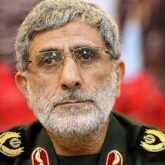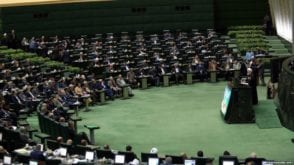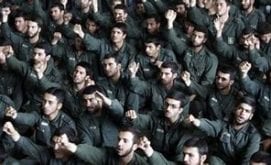Iran-HRM – The Iranian regime stepped up its crackdown on civil liberties amid severe economic pressure on Iranians.
Dozens of members of Iranian civil society were arrested or began prison sentences in July, including family members of slain protesters, lawyers and acclaimed film directors.
The clerical regime also continued horrendous daily executions.
Meanwhile, the regime ramped up repression and harassed Iranian women with the excuse of improper hijab.
Reports and public images on social media have shown guidance patrols deployed in various parts of the city as they violently grab women and girls, shoving them into patrol vehicles before taking them away. Government-affiliated plainclothes agents are also free to insult women and abuse them.
Although the mandatory hijab has always been a challenge between the people and the clerical regime since 1979, this time order by the regime’s President was a greater escalation of suppression against women
On July 5, Ebrahim Raisi ordered the Supreme Council of the Cultural Revolution to implement the 2004 resolution on chastity and hijab fully. Subsequently, leaders of Friday Prayers, as well as senior and junior government officials, have all called for tougher measures against women.
Many believe this is the regime’s way of dealing with unprecedented dissent amid an economic crisis in an attempt to hold on to its crumbling rule.
This monthly report overviews the continued executions, persecution of religious minorities, crackdown on civil society, and the stepped-up state-sponsored violence against women to impose the mandatory Hijab.
Executions:
The Iranian regime executed at least 71 people including 31 for drug-related offenses and 34 for murder. Four men were executed after being found guilty of rape charges and two were executed on the charge of Moharebeh. At least three women were among those executed.
On 23 July, the authorities executed Iman Sabzikar in public in Fars province, after a halt in public executions for two years during the pandemic.
#Iran publicly hanged Iman Sabzikar, a man who was convicted of the “intentional murder” of a corrupt member of security forces.
Public execution sentences sound the alarm over a new cycle of repression which has already been stepped up during Ebrahim Raisi’s tenure.#HumanRights pic.twitter.com/9aniYkjg54— IRAN HRM (@IranHrm) July 23, 2022
Recent research done by the Abdorrahman Boroumand Centre for Human Rights in Iran and Amnesty International showed that “During the first six months of 2022, the Iranian authorities executed at least one person a day on average.”
“The state machinery is carrying out killings on a mass scale across the country in an abhorrent assault on the right to life. Iran’s staggering execution toll for the first half of this year has chilling echoes of 2015 when there was another shocking spike,” said Diana Eltahawy, Deputy Regional Director for the Middle East and North Africa at Amnesty International.
“The renewed surge in executions, including in public, shows yet again just how out of step Iran is with the rest of the world, with 144 countries having rejected the death penalty in law or practice. The Iranian authorities must immediately establish an official moratorium on executions with a view to abolishing the death penalty completely,” said Roya Boroumand, Executive Director of Abdorrahman Boroumand Centre, an Iranian human rights organization.
Torture:
Iranian authorities amputated the fingers of a man convicted of theft on July 27, 2022, using a guillotine machine. The sentence was carried out in the presence of several officials and a doctor at Tehran’s Evin prison.
Less than two months ago, on 31 May, Iranian authorities also amputated the fingers of Sayed Barat Hosseini.
He has since been imprisoned in isolation in Evin prison and denied adequate treatment for his wounds which are infected after his fingers were cut off.
Diana Eltahawy, Amnesty International’s Deputy Director for the Middle East and North Africa said in a statement on July 29, “These amputations are particularly harrowing displays of the Iranian authorities’ contempt for human rights and dignity. Amputation is judicially sanctioned torture and, therefore, a crime under international law, and all those who were involved in ordering or implementing these corporal punishments should be prosecuted in fair trials.”
Prisoners
hunger strikes
There are health concerns about the condition of detained Union of Workers of Tehran and Suburbs Bus Company board member Reza Shahabi, who has been on hunger strike in Evin Prison since June 15. He was arrested at his home on May 10 by Intelligence Ministry officers shortly after publicly calling on the authorities to investigate death threats against him and his family.
Hassan Saeedi, a member of the Syndicate of Workers of Tehran and Suburbs Bus Company, is on hunger strike despite his poor health condition in Evin Prison. He is protesting against being detained without trial. He has been held in Ward 209 of Evin Prison in Tehran, controlled by Iran’s Intelligence Ministry.
Azerbaijani Turkic minority rights activist Akbar Abolzade went on a hunger strike on July 17 to protest being denied furlough.
Leila Chegini began her dry hunger strike on July 13, 2022, in protest of being detained without standing trial and investigating her case.
She is sick and at risk of paralysis of both her legs. Nevertheless, she is not allowed to be seen by a doctor. Due to her serious back injuries and bruised and swollen legs, she has repeatedly requested a doctor’s visit. She even undertook to pay the visiting cost. However, the Nowshahr Prison authorities have prevented her from going to medical facilities.
Denial of medical treatment
Yunes Al-Sarakhi, a poet and political prisoner in Shiban prison in Ahvaz in serious health conditions after a year of imprisonment. Still, the prison authorities have denied him medical treatment.
He has breathing problems and pain in his ribs and chest however prison authorities have deprived him of medical leave and access to medical treatment.
Latest reports from Gohardasht Prison in Karaj indicate that Arjang Davoudi is at risk of losing sight in both eyes. The 69-year-old political prisoner has been suffering from cataracts for two years without medical treatment. Now, Arjang Davoudi is at risk of losing sight in both eyes. Doctors say he needs urgent surgery, but Gohardasht prison authorities have refused to send him to the hospital.
Detained labor activist Valeh Zamani is being denied urgent medical care for Hepatitis C and severe intestinal adhesions and liver disease while in solitary confinement and facing long interrogations in Evin Prison.
Deaths in custody
The death of at least four prisoners in custody is emblematic of the dire prison conditions which are far below the UN Standard Minimum Rules for the Treatment of Prisoners.
A sick inmate died on July 13 after officers at the Greater Tehran Penitentiary failed to transfer him to the hospital in a timely manner. Two weeks prior to his death, Saeed Kavousipour went to prison’s infirmary demanding medical care, but prison doctors downplayed his health problem as a “figment”.
There has also been reports that two other prisoners died on July 22 at Ghezelhesar Prison due to being denied timely and urgent medical treatment.
Azam Pakdel died of stomach cancer in the women’s ward of Vakilabad Prison in Mashhad on July 24, 2022, due to a lack of medical attention.
Azam Pakdel, 40, was taken to the prison’s hospital on Saturday night, July 23, in critical condition. But she was examined in the hospital as an outpatient and returned to the ward. An informed source in Vakilabad Prison said Azam Pakdel had been sent to the hospital twice due to severe pain. Specialist physicians had diagnosed her with cancerous masses in her stomach. Despite the doctor’s emphasis on chemotherapy, the prison authorities did not take any action regarding the prisoner’s treatment. Azam Pakdel was even denied access to the medicines she needed.
Somayyeh Hashemi, imprisoned in Ward 3 of Qarchak Prison, died from a drug overdose over the past week.
Ward 3 of the notorious Qarchak Prison is where inmates convicted of robbery or drug-related offenses are detained. Somayyeh Hashemi died of a drug overdose in the same ward.
Some prison staff and officials who are not searched on arrival bring in the narcotic drugs. They sell the drugs at high prices to the drug dealers in prison, and eventually, the drug is sold to female prisoners.
Women’s rights
Over the past month, the Iranian regime has intensified its repressive measures and launched a new round of violence against women.
In addition to increasing arrests and summoning of women activists and issuing prison sentences for them, the clerical regime carried out specific social measures during July.
In late June, the regime’s Supreme Leader Ali Khamenei urged state security agencies and the judiciary to increase repression to the levels seen soon after the 1979 revolution, when thousands who had been accused of opposing the new regime were executed.
“In the year 1981, the Iranian nation was able to frustrate the enemy by sticking to one of the divine traditions, namely jihad and resistance,” Khamenei said during a speech on June 28. “Today, the same rule and law are in force, and God in the year 2022 is the same God he was in 1981.”
The 1980s are known as the “black era” in Iran due to the regime’s brutal crackdown on both civil and political liberties.
On July 5, the regime’s President Ebrahim Raisi ordered the Supreme Council of the Cultural Revolution to implement the 2004 resolution on chastity and hijab fully.
As a result, women with “improper hijab” have been banned from public services.
Malls and banks have been ordered not to allow entry to “improperly veiled” women.
In the northeastern city of Mashhad, women without “proper hijab” have been banned from subways, while special agents have been deployed in Mashhad’s medical centers to “evaluate and inspect the personnel and students’ hijab.”
The Governor of the southern city of Bushehr ordered the segregation of men and women working in government offices.
The Bank Mellat, with more than 1,400 branches in Iran, has issued a directive prohibiting female employees from wearing high-heels and thin stockings, make-up, and “unconventional” accessories. It also forbids its male managers from having women as administrative assistants.
During his last Friday Prayers Sermon, Senior Iranian cleric, Ahmad Khatami said “those who had improper hijab were the wives and children of thieves”.
Many believe this is the regime’s way of dealing with unprecedented dissent amid an economic crisis in an attempt to hold on to its crumbling rule.
Persecution of religious minorities
Bahais
Iranian authorities escalated persecution of Baha’i community in July.
A significant number of Iranian Baha’is were arrested last month including Shole Shahidi and her two sons, Faran and Shayan Sanaei, Haleh Gholami, Nilufar Hosseini, Behieh Manavipour, Alhan Hashemi, Hanan Hashemi, Nematollah Shadpour, Nima Shadpour, and Shafigh Eslami.
Iran’s intelligence ministry said on August 1 that it had arrested a number of adherents of the banned Baha’i faith for links to a centre in Israel, and for proselytising in schools and kindergartens.
The ministry statement, carried by state media, did not say how many people were arrested or when the arrests were made.
The Baha’i International Community – which represents the faith worldwide, tweeted on July 31 that “a significant number of Bahais,” including three of its former leaders, had been arrested in Iran.
Arbitrary murders
In June, Iran Human Rights Monitor recorded at least 18 arbitrary killings.
Most of the citizens who were shot and killed by the state forces were coal porters and fuel carriers who had turned to these jobs to make a living.
The state security forces shot and killed a Kurdish man identified as Sina Zafari, 21, on Tuesday in the city of Ahwaz, SW #Iran
The regime shoots/kills/wounds ethnic minorities including Kurds and the Baluch people with impunity.#HumanRights pic.twitter.com/WrE6sHLFqM— IRAN HRM (@IranHrm) July 29, 2022
Iranian forces shot two brothers, Ali and Sadollah Younesi in a border region where they were working as porters.
Sadollah died in the hospital and Ali is receiving treatment for serious bullet wounds. The regime regularly targets & kills porters with impunity.#Iran #HumanRights pic.twitter.com/iNP0NQwo0R— IRAN HRM (@IranHrm) July 26, 2022
In a most recent case, the state security forces opened fire on a car at a checkpoint in Khorramabad, western Iran killing two minors identified as 11-year-old Mehdi and 9-year-old Matin, who were brothers. Their parents are reported to be in critical condition. The regime kills ethnic minorities with impunity.
According to a Kurdish human rights group, #Iran security forces opened fire on a car at a checkpoint in Khorramabad, W Iran killing 11 yr old Mehdi & 9yr old Matin, who were brothers. Their parents are in critical condition.
The regime kills ethnic minorities with impunity. pic.twitter.com/icIun6kaU0— Iran News Wire (@IranNW) August 1, 2022
 Shabtabnews In this dark night, I have lost my way – Arise from a corner, oh you the star of guidance.
Shabtabnews In this dark night, I have lost my way – Arise from a corner, oh you the star of guidance.



